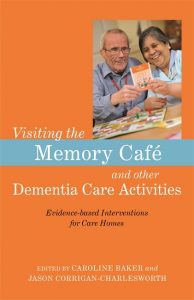Visiting the Memory Café and other Dementia Care Activities 
Evidence-based Interventions for Care Homes
Edited by Caroline Baker and Jason Corrigan-Charlesworth.
Jessica Kingsley Publishers 2017, ISBN: 9781785922527
£16.99
They can be few families who are not affected by an individual who is engaging with some degree of significant memory loss. For some the prospect of old age is rather haunted by the possibility of having to embrace dementia. Understandably we fear the loss of our memory and its instrumental part of our well-being and personhood.
Jessica Kingsley continues to seek to resource our understanding of dementia, and a compassionate and practical approach to person centred care. This book works on the widespread assumption that activity and engagement are vital to our well-being throughout our lives and this is carried on and through with people living with dementia. Maintaining and developing this activity and engagement is necessary at every stage of our independence and dependence.
The editors draw together a rich and skilled collection of writers and practioners who explore aspects of how particular interventions with people living with dementia can improve and develop quality of life. This volume consistently challenges us to think about what we have to learn from people living with dementia. Underlying this approach is a commitment to the fundamental importance of getting to know the individual well.
Chapter 1 explores and discusses to life story activity that helps an individual document key memories as part of embracing a deeper knowledge of the person and their living. Chapter 2 introduces an intervention designed and developed to encompass a digital approach to reminiscence therapy. Chapter 3 discusses the use of Namaste and how this has helped one particular care home improve well-being and nutrition. We learn about the implementation of empathy dolls in chapter 4 and chapter 5 informs the reader about the introduction of memory Cafés within a home care setting. Chapter 6 explores the introduction programmes of physical activity and in chapter 7 we discover something of the use of guided imagery accompanied by smells and sounds. There is an impressive commitment in all of these case study based chapters to focus on the individual and provide them with an environment within which they can thrive. Chapter 8 discusses the maintenance of daily living skills; chapter 9 reminds us of the importance of environment and chapter 10 evaluates some of this practice-based research.
The editors are clear that this is work in progress emerging out of the Barchester Charitable Foundation. It is distinctive, well written and grounded in practice. It not only offers many practical suggestions about programs and therapies but challenges us to think differently about how best to embrace memory change and memory loss within ourselves and others.
This book should become essential reading for all those who are tasked to provide care for people living with dementia. However I think it also would help families to think through how best to support loved ones.
As ever with Jessica Kingsley Publishing this book is well designed and printed and is easy to read and follow. There is a good index and a comprehensive bibliography.
Professor James Woodward
Sarum College
